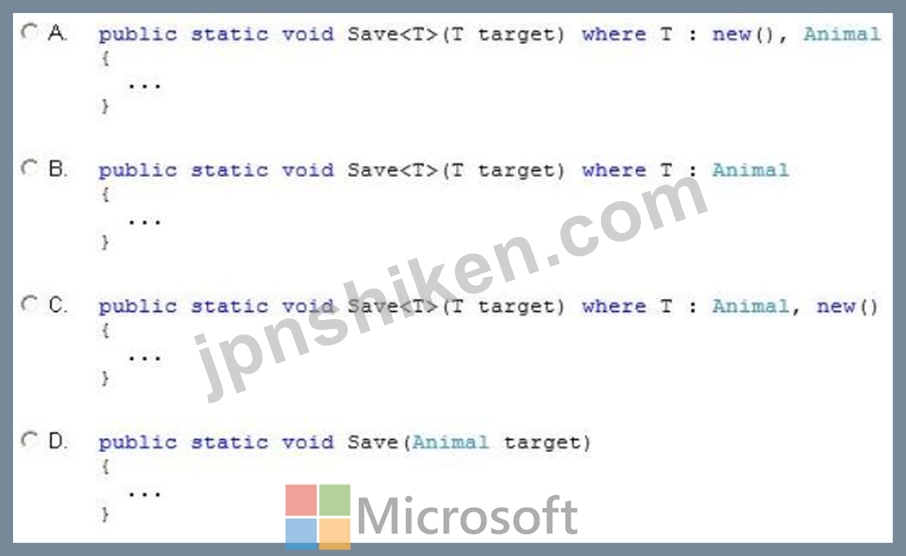有効的な70-483J問題集はJPNTest.com提供され、70-483J試験に合格することに役に立ちます!JPNTest.comは今最新70-483J試験問題集を提供します。JPNTest.com 70-483J試験問題集はもう更新されました。ここで70-483J問題集のテストエンジンを手に入れます。
70-483J問題集最新版のアクセス
「305問、30% ディスカウント、特別な割引コード:JPNshiken」
あなたは動物園の動物についての情報を管理するアプリケーションを作成しています。 アプリケーションでは、動物の名前のクラスと保存という名前のメソッドが含まれています。
save()メソッドは、厳密に型指定されている必要があります。パラメータを受け入れないコンストラクタを使用している動物のクラスから継承されたタイプのみを許可する必要があります。
あなたはsave()メソッドを実装する必要があります。あなたはどのコードセグメントを使うべきですか?

save()メソッドは、厳密に型指定されている必要があります。パラメータを受け入れないコンストラクタを使用している動物のクラスから継承されたタイプのみを許可する必要があります。
あなたはsave()メソッドを実装する必要があります。あなたはどのコードセグメントを使うべきですか?

正解:C
Explanation
The condition new() ensures the empty/default constructor and must be the last condition.
When you define a generic class, you can apply restrictions to the kinds of types that client code can use for type arguments when it instantiates your class. If client code tries to instantiate your class by using a type that is not allowed by a constraint, the result is a compile-time error. These restrictions are called constraints.
Constraints are specified by using the where contextual keyword.
http://msdn.microsoft.com/en-us/library/d5x73970.aspx
The condition new() ensures the empty/default constructor and must be the last condition.
When you define a generic class, you can apply restrictions to the kinds of types that client code can use for type arguments when it instantiates your class. If client code tries to instantiate your class by using a type that is not allowed by a constraint, the result is a compile-time error. These restrictions are called constraints.
Constraints are specified by using the where contextual keyword.
http://msdn.microsoft.com/en-us/library/d5x73970.aspx
- 質問一覧「100問」
- 質問1 Customerというクラスを含むアプリケーションを開発しています。...
- 質問2 あなたは、アプリケーションを開発しています。 アプリケーショ
- 質問3 あなたは次のクラスを持っています。 (行番号は参照用にのみ記
- 質問4 アプリケーションが扱われていないNullReferenceExceptionとForm...
- 質問5 Nameという名前のプロパティを持つProductという名前のクラスが...
- 質問6 次のコード行があります。 Type type1 = typeof^MyClass); タイ...
- 質問7 情報を画面に出力するC#コンソールアプリケーションを開発して
- 質問8 あなたは、EmployeeRosterという名前をつけられるクラスを開発し...
- 質問9 あなたは、ユーザからの日付の入力を受け付けるアプリケーション
- 質問10 あなたは次のコードを持っています: (Exhibit) 次の各文につい...
- 質問11 Microsoft Access 2013データベースからデータを取得するメソッ...
- 質問12 あなたは、マイクロソフトVisual Studio2013を使ってアプリケー...
- 質問13 次の要件を満たすコンソールアプリケーションを作成する必要があ
- 質問14 .xmlファイルを受け入れる既存の受注処理システムがあり、 次の...
- 質問15 C +で書かれた外部アセンブリ1、アセンブリ1 Iのメソッドを呼び...
- 質問16 次のC#があります(行番号は参照用としてのみ含まれています)
- 質問17 あなたは次のコードを持っています: (Exhibit) 答えるには、コ...
- 質問18 あなたはC#を使ってアプリケーションを開発しています。 アプリ...
- 質問19 ページングを使用するアプリケーションがあります。 各ページに
- 質問20 アプリケーションは、ストリームからXMLを直列化および逆直列化...
- 質問21 文字列strJsonが有効なJSON文字列かどうかを検証する必要があり...
- 質問22 エラーが発生したときにログファイルの情報を表示するアプリケー
- 質問23 あなたは、C#を使用してアプリケーションを開発しています。 ア...
- 質問24 あなたはアプリケーションをテストしています。 このアプリケー
- 質問25 あなたは、次のコードを持っています。 (行番号は参考のために
- 質問26 あなたは次のクラスを持っています: (Exhibit) IEquatableを実...
- 質問27 Assembly1とAssembly2の2つのアセンブリがあり、C#で記述されて...
- 質問28 Applという名前のコンソールアプリケーションを作成しています。...
- 質問29 カスタム例外タイプのセットを実装するアプリケーションを開発し
- 質問30 あなたはC#を使ってアプリケーションを開発しています。 あなた...
- 質問31 あなたは、C#を使用してアプリケーションを開発しています。 ア...
- 質問32 あなたはC#でアプリケーションを開発しています。 アプリケーシ...
- 質問33 あなたは、ProcessDataはという名前の新しいメソッドを実装して...
- 質問34 あなたはアプリケーションを開発しています。 整数をパラメータ
- 質問35 あなたは次のコードを持っています。 string MessageString = "T...
- 質問36 カスタム例外タイプのセットを実装するアプリケーションを開発し
- 質問37 Microsoft SQL Serverデータベースにアクセスするアプリケーショ...
- 質問38 Microsoft ADO.NET Entity Frameworkを使用してMicrosoft SQL Se...
- 質問39 productsという名前のProductオブジェクトのコレクションがあり...
- 質問40 文字列入力としてaParamという名前のパラメーターを取る関数を開...
- 質問41 あなたはアプリケーションを開発しています。 このアプリケーシ
- 質問42 プレイヤーが0から1000までのコインを収集するゲームを開発して...
- 質問43 あなたは、値型と参照型の間で転換を実行するFloorTemperatureと...
- 質問44 あなたは、図書館の本を追跡するためのクラスという名前BookTrac...
- 質問45 UpdateScoreというパブリックメソッドをScoreCardという名前のパ...
- 質問46 あなたは、以下の方法(行番号は参考のために含まれるだけです)
- 質問47 長時間実行するタスクを実行するProcessDataという名前のメソッ...
- 質問48 あなたは、C#を使用してアプリケーションを開発しています。 開...
- 質問49 あなたはアプリケーションを開発しています。 アプリケーション
- 質問50 あなたは次のコードを持っています。 (Exhibit) 入力番号が0より...
- 質問51 あなたはアプリケーションをテストしています。 このアプリケー
- 質問52 アプリケーションは、ストリームからXMLを直列化および逆直列化...
- 質問53 注:この質問は、同じシナリオを提示する一連の質問の一部です。
- 質問54 Messageという名前のパブリッククラスには、SendMessage()メソ...
- 質問55 Employeeという名前のクラスを作成しています。クラスはEmployee...
- 質問56 Assembly1.dllという名前のアセンブリを作成します。 Assembly1....
- 質問57 C#を使用してメソッドを作成しています。 このメソッドは3つの...
- 質問58 あなたは次のクラスを開発しています: * Class1 * Class2 * Cla...
- 質問59 ProcessDataという名前の新しいメソッドを実装しています。 Proc...
- 質問60 GetDataという名前のメソッドを含むアプリケーションを開発して...
- 質問61 Productという名前のクラスを含むC#アプリケーションを開発して...
- 質問62 次の要件を満たすコンソールアプリケーションを作成する必要があ
- 質問63 あなたは、次のコードを持っています。(線番号は参考のために含
- 質問64 カスタム例外タイプのセットを実装するアプリケーションを開発し
- 質問65 あなたは、以下の方法(行番号は参考のために含まれるだけです)
- 質問66 あなたは、Employeeと従業員の一般的なリストと呼ばれるクラスを...
- 質問67 あなたは次のコードを見直しています: (Exhibit) 次の各文につ...
- 質問68 あなたは、C#を使用してアプリケーションを開発しています。 あ...
- 質問69 Windows Forms(WinForms)アプリケーションを開発しています。...
- 質問70 注:この質問は、同じシナリオを提示する一連の質問の一部です。
- 質問71 Customerという名前のクラスとcustomersという名前の変数があり...
- 質問72 あなたは、FullNameと名付けられたクラスを使うアプリケーション...
- 質問73 あなたは番号のリストを処理するアプリケーションを作成していま
- 質問74 次の要件を満たすコンソールアプリケーションを作成する必要があ
- 質問75 あなたは、ファイルのためにハッシュ価値をつくるGenerateHashと...
- 質問76 あなたは次のクラスを持っています (行番号は参照用にのみ含まれ...
- 質問77 あなたは以下のクラス定義を持っています。 (Exhibit) Shapeから...
- 質問78 あなたは次のコードを持っています。 (Exhibit) myDataリストか...
- 質問79 あなたは、64ビットのC#アプリケーションをデバッグしています...
- 質問80 あなたは、optimize performanceに複数の非同期仕事を使うアプリ...
- 質問81 あなたは次のコードを持っています。 (Exhibit) すべての製品と...
- 質問82 あなたは、ウェブ・アプリケーションで使われるクラス・ライブラ
- 質問83 あなたは次のC#コードを持っています。 (行番号は参照用にのみ...
- 質問84 あなたは、アセンブリを開発しています。 アセンブリが開発され
- 質問85 あなたはC#を使用してアプリケーションを開発しています。アプ
- 質問86 アプリケーションは、次の形式でJSONデータを受信します。 (Exhi...
- 質問87 Orderという名前のクラスを含むアプリケーションを開発していま...
- 質問88 あなたは、パスワードをWindows Azure SQL Databaseデータベース...
- 質問89 次のC#コードがあります。 (Exhibit) コードの出力は何ですか?...
- 質問90 あなたは、C#を使用してアプリケーションを開発しています。 ア...
- 質問91 Microsoft Visual Studio 2013でアプリケーションを構築していま...
- 質問92 C#アプリケーションの例外を処理するコードを記述しています。 ...
- 質問93 あなたは動物園の動物についての情報を管理するアプリケーション
- 質問94 EvaluateLoan、ProcessLoan、およびFundLoanという名前のメソッ...
- 質問95 CustomerというクラスとOrderというクラスがあります。 顧客クラ...
- 質問96 App1という名前のコンソールアプリケーションを作成しています。...
- 質問97 あなたは、データベースから読むアプリケーションを作成していま
- 質問98 Orderという名前のクラスを含むアプリケーションを開発していま...
- 質問99 以下のインターフェースを実装する予定です。 (Exhibit) 次の方...
- 質問100 あなたは、パフォーマンスを最適化するために複数の非同期仕事を

